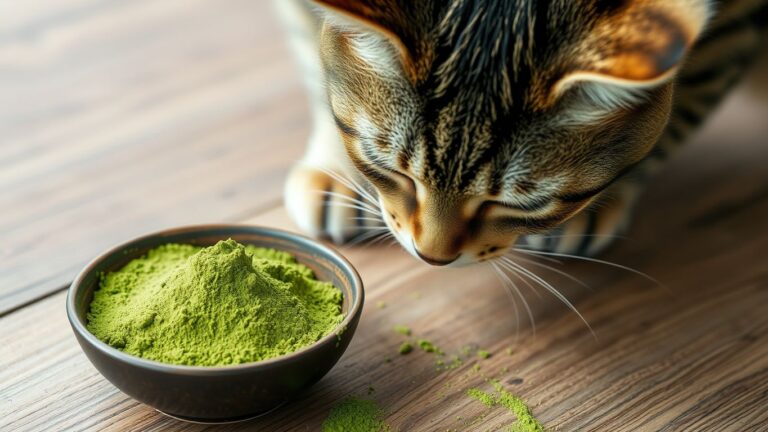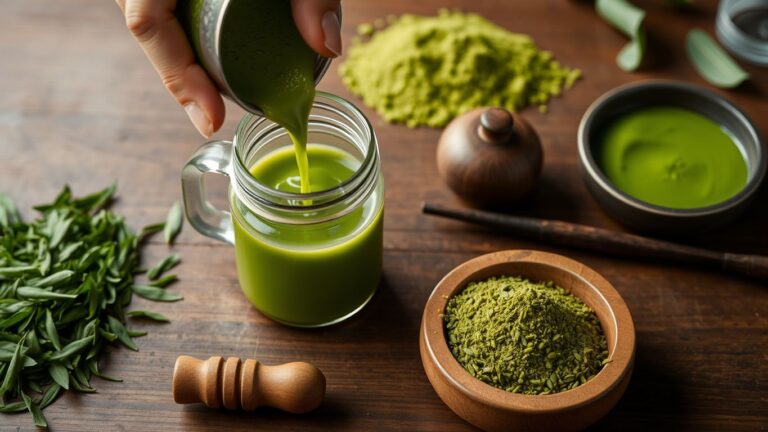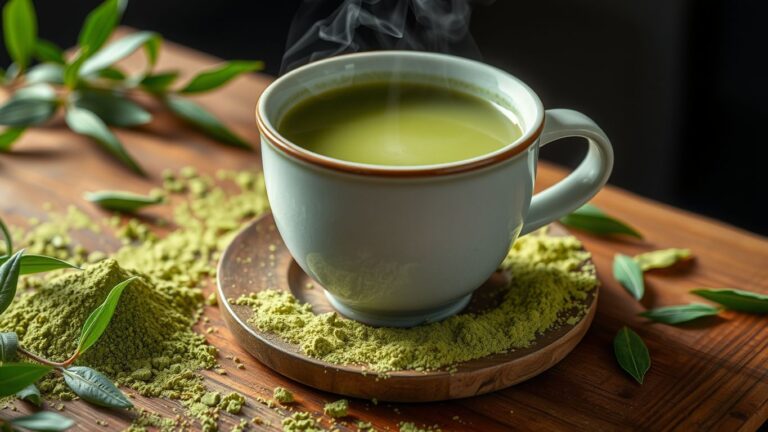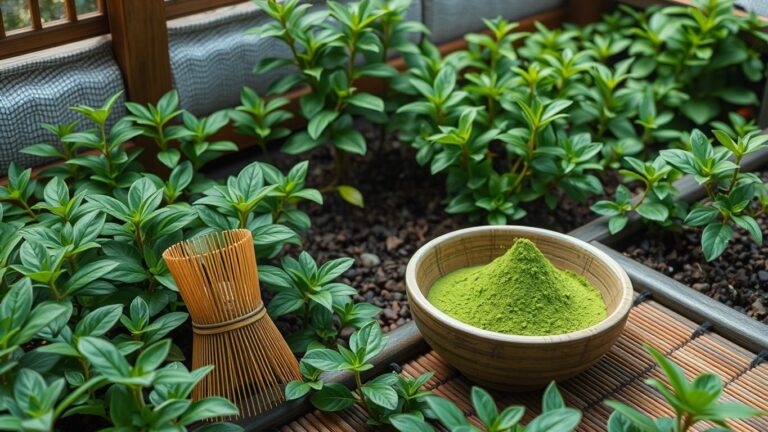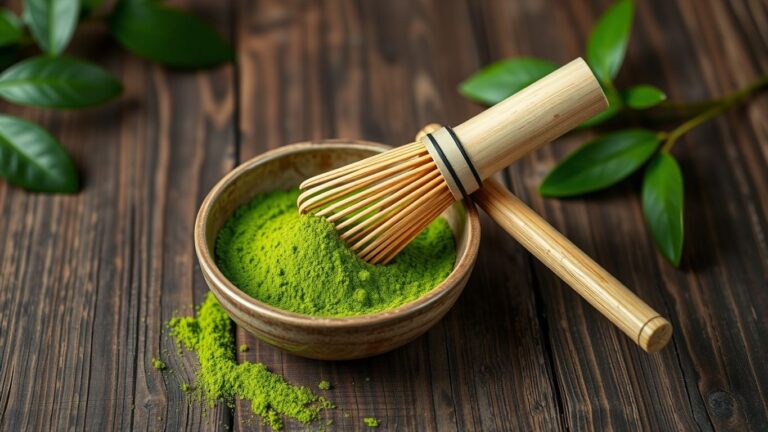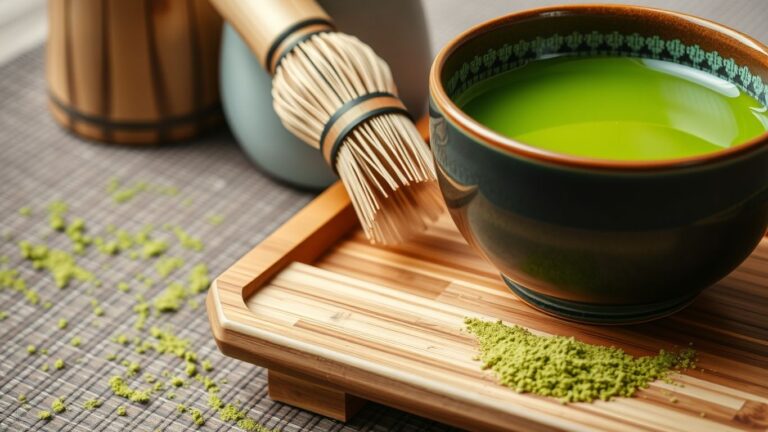Matcha, a type of powdered green tea originating from Japan, has gained immense popularity worldwide due to its unique flavor and numerous health benefits. But one question often arises: does matcha contain caffeine? This article dives deep into the caffeine content of matcha, comparing it to other beverages, exploring its health benefits, and providing tips on how to incorporate it into your daily routine.
Key Takeaways
- Matcha is not caffeine-free; it contains more caffeine than regular green tea but less than coffee.
- The caffeine in matcha provides a steady energy boost without the jitters often associated with coffee.
- Matcha is rich in antioxidants, which help protect the body from damage and support overall health.
- There are various factors, such as the quality of matcha and preparation methods, that affect its caffeine content.
- Incorporating matcha into your daily routine can offer multiple health benefits, including improved mental clarity and metabolism.
Understanding Matcha and Its Origins
What is Matcha?
Matcha is a type of powdered green tea that comes from Japan. Unlike other teas, matcha involves grinding whole green tea leaves into a fine powder. This means you consume the entire leaf, which preserves more nutrients and flavor. The result is a vibrant green drink with a unique, earthy taste.
How Matcha is Produced
The production of matcha is a meticulous process. Tea plants are shaded for about three weeks before harvest to increase chlorophyll levels. After harvesting, the leaves are steamed, dried, and ground into a fine powder using granite stones. This traditional method ensures the highest quality of matcha.
The Cultural Significance of Matcha
Matcha has deep roots in Japanese culture. It was introduced to Japan in the 1100s and has since become a staple in Japanese tea ceremonies. These ceremonies are not just about drinking tea but also about appreciating the art and mindfulness involved in its preparation. Matcha is more than just a drink; it’s a cultural experience.
Matcha, powdered green tea of Japanese origin by way of China, is popular among tea connoisseurs everywhere. Matcha was introduced to Japan in the 1100s by Buddhist monks and has since become an integral part of Japanese culture.
The Caffeine Content in Matcha

How Much Caffeine is in Matcha?
Matcha contains between 18.9 and 44.4 milligrams of caffeine per gram of tea. For a typical serving of matcha, which is about 2-4 grams, you can expect around 40-180 mg of caffeine per cup. On average, matcha contains approximately 20-45mg of caffeine per gram. This is higher than most other green teas.
Factors Affecting Caffeine Levels
Several factors can influence the caffeine content in your matcha:
- The quantity of matcha powder used
- The temperature of the water
- The age of the tea leaves
- The time of harvesting
Using more matcha powder and higher water temperatures will increase the caffeine content per cup. Conversely, using less powder or cooler water will reduce it.
Comparing Caffeine in Matcha to Other Teas
When comparing matcha to other teas, matcha generally has more caffeine per gram. Here’s a quick comparison:
| Type of Drink | Caffeine Content per Gram |
|---|---|
| Matcha | 18.9–44.4 mg/g |
| Green Tea | 11.3–24.67 mg/g |
| Black Tea | 14.3–34.8 mg/g |
| Coffee | 10–12 mg/g |
Matcha contains more caffeine per gram than coffee and other teas. However, the caffeine content per cup depends on how you prepare it.
Matcha vs. Coffee: Caffeine Showdown

Caffeine Content Comparison
When comparing caffeine levels, coffee generally has more caffeine per serving than matcha. For instance, an average cup of coffee contains about 96 mg of caffeine per 8 ounces. In contrast, a 2-ounce cup of matcha tea, prepared traditionally with one teaspoon, contains around 32 mg of caffeine. However, matcha’s caffeine content can vary depending on the amount of powder used.
| Beverage | Serving Size | Caffeine Content |
|---|---|---|
| Coffee | 8 ounces | 96 mg |
| Matcha | 2 ounces | 32 mg |
Effects on Energy Levels
The energy boost from coffee is quick but often short-lived, lasting about 1-3 hours before a crash occurs. This is why many coffee drinkers find themselves reaching for multiple cups throughout the day. On the other hand, matcha provides a more sustained energy boost that can last up to 4-6 hours. This is due to the presence of L-theanine, an amino acid that helps regulate the absorption of caffeine in the bloodstream, promoting a state of calm alertness.
Matcha’s energy boost is smoother and more prolonged, making it a great option for those who want to avoid the jitters and crashes associated with coffee.
Health Implications
Coffee can sometimes lead to increased anxiety and nervousness, especially when consumed in large amounts. In contrast, matcha’s high concentration of L-theanine has a calming effect on both the body and mind. This makes matcha a better choice for those who are sensitive to caffeine or prone to anxiety. Additionally, the slow release of caffeine in matcha helps to avoid the spikes in adrenaline, glucose, and insulin levels that are often caused by coffee.
In summary, while coffee provides a quick and intense caffeine boost, matcha offers a more balanced and sustained energy level, along with additional health benefits. Choose the one that best fits your lifestyle and caffeine needs.
Health Benefits of Matcha Beyond Caffeine
Antioxidant Properties
Matcha is rich in catechins, a type of plant compound that acts as a natural antioxidant. These antioxidants help stabilize harmful free radicals, which can damage cells and lead to chronic diseases. Including matcha in your diet can increase your antioxidant intake, potentially preventing cell damage and lowering the risk of several chronic diseases.
Impact on Metabolism
Matcha can also boost your metabolism. The combination of caffeine and catechins in matcha has been shown to enhance metabolic rate and increase fat burning. This makes matcha a great addition to your diet if you’re looking to manage your weight more effectively.
Mental Clarity and Focus
One of the standout benefits of matcha is its ability to improve mental clarity and focus. The presence of L-theanine, an amino acid, works in harmony with caffeine to provide a calm alertness. This means you can stay focused and clear-headed without the jitters often associated with other caffeinated beverages.
Including matcha in your daily routine can offer a range of health benefits beyond just a caffeine boost. From antioxidants to improved mental clarity, matcha is a versatile addition to a healthy lifestyle.
How to Prepare Matcha for Optimal Benefits
Traditional Preparation Methods
To make traditional matcha tea, start by sifting 1-2 teaspoons of matcha powder into your cup. Add about 2 ounces of hot water and whisk it together using a bamboo whisk until it becomes frothy. For a thinner tea, use less powder and more water. For a more concentrated version, use more powder and less water. The best way to do this is to add a little bit of the hot water first to create a paste, and then slowly add the rest of the water in.
Modern Twists on Matcha
You can get creative with matcha by combining it with other ingredients. Try adding matcha to your smoothies, lattes, or even desserts like ice cream and cookies. You can also mix matcha with turmeric for a unique tea or latte. Stirring matcha into milk-based foods and drinks, such as lattes or rice pudding, is another great option.
Tips for Maximizing Caffeine Benefits
To get the most out of matcha’s caffeine, consider these tips:
- Use high-quality matcha: The better the quality, the more benefits you’ll get.
- Drink it in the morning: This can help you stay energized throughout the day.
- Combine with healthy fats: Adding a bit of coconut oil or almond milk can help your body absorb the caffeine more slowly, giving you a longer-lasting energy boost.
Remember, there are many ways to prepare matcha, so you can choose the one you like best. It can also be incorporated into a range of different recipes.
Potential Side Effects of Matcha’s Caffeine
Understanding Caffeine Sensitivity
Some people tolerate caffeine well, while others may experience side effects. Potential signs of caffeine sensitivity include anxiety, jitters, fast heartbeat, nausea, headache, and trouble sleeping. The FDA notes that some people are more sensitive to caffeine than others, especially those with underlying heart conditions.
Balancing Matcha Intake
To avoid side effects, it’s important to balance your matcha intake. Start with a small amount, like half a teaspoon, and see how your body reacts. If you tolerate it well, you can gradually increase the amount. Drinking lots of water, eating food, and taking deep breaths can help if you experience symptoms.
Recognizing Overconsumption Symptoms
Although rare, caffeine overdose is possible. Symptoms include confusion, hallucinations, difficulty breathing, and convulsions. If you experience severe symptoms, seek emergency help immediately. Common matcha side effects include headaches, upset stomach, trouble sleeping, irritability, diarrhea, constipation, and heartburn.
Matcha for Different Lifestyles

Matcha is a versatile beverage that fits seamlessly into various lifestyles. Whether you’re a fitness enthusiast, a busy professional, or someone seeking relaxation, matcha has something to offer you.
Debunking Myths About Matcha and Caffeine
Common Misconceptions
There are several myths about matcha and caffeine that need to be cleared up. One common myth is that matcha is caffeine-free. This is not true. Matcha does contain caffeine, although it’s less than most cups of coffee. On average, a cup of matcha contains about 70mg of caffeine, compared to 100-140mg in a cup of coffee. Another myth is that matcha gives you the jitters like coffee. In reality, the caffeine in matcha is released slowly, providing a smoother energy boost.
Scientific Evidence
Scientific studies have shown that matcha contains an amino acid called L-theanine. This amino acid helps to slow down the absorption of caffeine, making the energy boost from matcha last longer and feel smoother. Unlike coffee, which can cause a quick spike and then a crash, matcha provides a more balanced energy release. This makes it a great option for those who are sensitive to caffeine.
Expert Opinions
Experts agree that matcha is a good alternative to coffee for those looking for a more balanced energy boost. Nutritionists often recommend matcha for its additional health benefits, such as its high antioxidant content. Some even say that matcha can help with mental clarity and focus, making it a popular choice for busy professionals and students alike.
Choosing the Right Matcha for Your Needs

Ceremonial vs. Culinary Matcha
When selecting matcha, it’s important to understand the difference between ceremonial and culinary grades. Ceremonial matcha is made from the youngest tea leaves and is intended for traditional tea ceremonies. It has a smooth, delicate flavor. Culinary matcha, on the other hand, is slightly more bitter and is perfect for cooking and baking.
Organic vs. Non-Organic Matcha
Organic matcha is grown without synthetic pesticides or fertilizers, making it a healthier choice for you and the environment. Non-organic matcha may contain residues from these chemicals. If you prioritize health and sustainability, organic matcha is the way to go.
Reading Labels and Certifications
When buying matcha, always check the labels for certifications. Look for terms like "organic," "ceremonial grade," and "first harvest." These labels ensure you’re getting high-quality matcha. Also, consider the origin; matcha from Japan, especially from regions like Uji, is often superior.
Choosing the right matcha can enhance your experience and provide the best health benefits. Make sure to consider the type, quality, and origin of the matcha you choose.
Incorporating Matcha into Your Daily Routine
Morning Rituals with Matcha
Start your day with a refreshing cup of matcha. It’s a great alternative to coffee and can be prepared quickly. Simply whisk matcha powder into hot water for a traditional tea or mix it with steamed milk for a creamy latte. This can help you feel more alert and ready to tackle the day.
Matcha in Cooking and Baking
Matcha isn’t just for drinking. You can add it to various recipes to boost their nutritional value. Try stirring matcha into milk-based foods like rice pudding or incorporating it into desserts such as matcha ice cream or cookies. This way, you can enjoy the health benefits of matcha in different forms.
Matcha-Based Beverages
There are many ways to enjoy matcha beverages. For a quick and easy option, try cold brew matcha. Just mix matcha powder with cold water and shake well. You can also get creative by combining matcha with other ingredients like turmeric for a unique twist. These beverages can be a delightful addition to your daily routine.
Sustainable and Ethical Matcha Consumption
Environmental Impact of Matcha Production
When it comes to sustainability, matcha often stands out. Compared to coffee sustainability, research points to matcha tea often being a more sustainable beverage choice. The production of matcha involves less water and fewer resources. Additionally, matcha plants are typically grown in shaded areas, which helps conserve soil and water.
Supporting Ethical Brands
Choosing matcha from ethical brands ensures that you are supporting fair labor practices and environmentally friendly farming methods. Look for certifications like Fair Trade, Organic, and Rainforest Alliance. These labels indicate that the brand adheres to high ethical standards.
Making Eco-Friendly Choices
To make your matcha consumption more eco-friendly, consider the following tips:
- Buy in bulk to reduce packaging waste.
- Use reusable containers and utensils.
- Opt for brands that use sustainable packaging materials.
- Support local producers to reduce carbon footprint.
By making mindful choices, you can enjoy your matcha while also caring for the planet.
Remember, every small step counts towards a more sustainable future.
Conclusion
In summary, matcha is not caffeine-free. In fact, it often contains more caffeine than regular green tea. However, the caffeine in matcha is released more slowly, providing a longer-lasting energy boost without the jitters or crash that coffee can cause. This makes matcha a great choice for those looking for a steady source of energy. Plus, it comes with added health benefits like antioxidants and calming effects. So, if you’re considering switching up your caffeine routine, matcha might just be the perfect option for you.
Frequently Asked Questions
Does matcha have caffeine?
Yes, matcha contains caffeine. The amount can vary but typically ranges from 18 to 50 mg per gram of matcha powder.
How does the caffeine in matcha compare to coffee?
Matcha generally has less caffeine than coffee. A cup of matcha has about 70 mg of caffeine, while a cup of coffee can have between 100-140 mg. However, the energy boost from matcha lasts longer.
What makes matcha different from regular green tea?
Matcha is made from whole tea leaves that are ground into a fine powder. This means you consume the entire leaf, which provides more nutrients and caffeine compared to regular green tea, where the leaves are steeped and then removed.
Can matcha help with focus and mental clarity?
Yes, matcha contains an amino acid called L-theanine, which promotes a state of calm alertness. This helps improve focus and mental clarity without the jitters often associated with coffee.
Are there different types of matcha?
Yes, there are different grades of matcha, mainly ceremonial and culinary. Ceremonial matcha is of higher quality and is used in traditional tea ceremonies, while culinary matcha is used for cooking and baking.
How should I store matcha to keep it fresh?
Matcha should be stored in an airtight container in a cool, dark place. Some people prefer to keep it in the refrigerator or freezer to maintain its freshness.
Can matcha be used in cooking and baking?
Absolutely! Matcha can be added to various recipes, including smoothies, lattes, cakes, and cookies, to give them a unique flavor and a health boost.
What are the potential side effects of consuming too much matcha?
While matcha has many health benefits, consuming too much can lead to side effects like insomnia, headaches, and digestive issues due to its caffeine content. It’s best to enjoy matcha in moderation.

